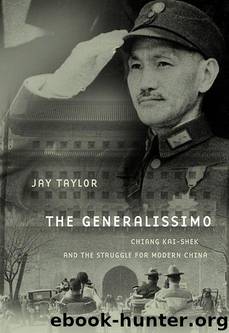The Generalissimo by Taylor Jay

Author:Taylor, Jay [Taylor, Jay]
Language: eng
Format: mobi
Published: 0101-01-01T00:00:00+00:00
9
The Great Failure
With his recent victory over Lin Biao still untarnished, Du Yuming was suffering another bout of bad health, and in early July after Li Zongren declined the Manchurian command, Chiang chose Chen Cheng to replace him.1 On August 29, Chen became commander of the Northeast Headquarters, responsible for all political, economic, and military matters. Chen, now the leader of fourteen armies, persuaded Chiang to increase the total number of government troops to about 500,000. He also replaced many senior military officers as well as the chairmen of all the provincial party committees in the region, a sweep that suggested the extent of corruption and ineptness he believed existed. He arrested some of the officers and KMT officials and “deported” others back to Nanking.2 Ambassador Stuart reported that Chen’s reforms were having an “excellent effect on political and military morale.” But, he added, the sixth Communist offensive was expected as soon as the roads dried, and it was doubtful these changes would have sufficient time to offset the decay.3
The heavy military manpower balance in Manchuria in favor of the Communists, their control of probably 90 percent of the countryside in that region, their Soviet support, and their strong position in North China made Chiang’s decision to pour more troops into the Northeast a huge, irrational— in fact, a mad—gamble. In addition to low morale and other disadvantages, his American-equipped divisions in Manchuria had no likely source of ammunition, parts, or replacements for their American weapons and equipment and their inventories were running dangerously low. His thinking was perhaps revealed in one journal entry where he wrote that without the Northeast, the naval ports of Shandong would soon be lost and all of North China
378
would be open to China’s enemies. Chiang seemed to be saying that whether he withdrew from Manchuria or was defeated in an all-out effort in the region, he would in either case eventually lose all of China.4
Chiang’s continued denigration of his army officers and KMT officials certainly underscored his previously sporadic but now prevailing pessimism about the long-term outcome of the struggle with the Communists. At a surprise plenary meeting of the Executive Committee on September 9, the Generalissimo once again told his comrades that the Communists had proved themselves “abler and more devoted” members of a revolutionary party. “Reform and rejuvenation of the Kuomintang,” he declared, were “doomed.”5 On other occasions he accused senior officers of embezzling grain and money intended for the troops and expressed admiration for the discipline and morality of the Communists. As with similar harangues since early 1947, these may well have hurt rather than helped his efforts to change the officers’ behavior.
Meanwhile, in Washington, the suppression of Wedemeyer’s report provoked much suspicion and protest. Under increasing political pressure, in October the Department of State devised a new economic assistance program for China. Marshall told the Senate that the plan envisioned about US$25 million a month for a total of US$300 million annually, but it was uncertain when any funds would actually be available.
Download
This site does not store any files on its server. We only index and link to content provided by other sites. Please contact the content providers to delete copyright contents if any and email us, we'll remove relevant links or contents immediately.
| Historic | Information Systems |
| Regional |
Man-made Catastrophes and Risk Information Concealment by Dmitry Chernov & Didier Sornette(6019)
The Revenge of Geography: What the Map Tells Us About Coming Conflicts and the Battle Against Fate by Kaplan Robert D(4077)
Zero Waste Home by Bea Johnson(3837)
COSMOS by Carl Sagan(3623)
Good by S. Walden(3554)
In a Sunburned Country by Bill Bryson(3542)
The Fate of Rome: Climate, Disease, and the End of an Empire (The Princeton History of the Ancient World) by Kyle Harper(3067)
A Wilder Time by William E. Glassley(2862)
Camino Island by John Grisham(2798)
Organic Mushroom Farming and Mycoremediation by Tradd Cotter(2690)
The Ogre by Doug Scott(2683)
Human Dynamics Research in Smart and Connected Communities by Shih-Lung Shaw & Daniel Sui(2500)
Energy Myths and Realities by Vaclav Smil(2492)
The Traveler's Gift by Andy Andrews(2461)
9781803241661-PYTHON FOR ARCGIS PRO by Unknown(2370)
Inside the Middle East by Avi Melamed(2356)
Birds of New Guinea by Pratt Thane K.; Beehler Bruce M.; Anderton John C(2255)
A History of Warfare by John Keegan(2243)
And the Band Played On by Randy Shilts(2209)
